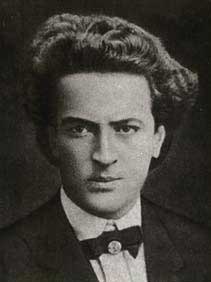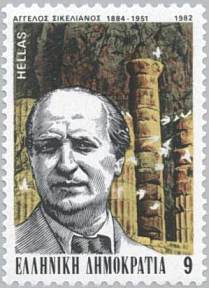.

Angelos Sikelianos (28 March 1884-19 June 1951)[1] (Greek: Άγγελος Σικελιανός) was a Greek lyric poet and playwright. He wrote on national history, religious symbolism, and universal harmony in poems such as The Light-Shadowed, Prologue to Life, Mother of God, and Delphic Utterance. His plays include Sibylla, Daedalus in Crete, Christ in Rome, The Death of Digenis, and Asklepius. He was the first twentieth-century Greek poet being candidate for the Nobel Prize in Literature
Biography
The house of Angelos Sikelianos at Delphi.
Sikelianos was born in Lefkada where he spent his childhood. In 1900 he entered the Law School of Athens but did not graduate.
The next years he travelled extensively and devoted himself to poetry. In 1907, he married American born Eva Palmer, who was at the time an archaeology student in Paris. They married in America and moved to Athens in 1908. During that period, Sikelianos came in contact with Greek intellectuals, and in 1909 he published his first collection of poems, Alafroískïotos (The Light-Shadowed), which had an immediate impact and was recognized by critics as an important work.

He also befriended fellow writer Nikos Kazantzakis, and in 1914 they spent forty days on Mount Athos, visiting most of the monasteries there and living the life of ascetics. The following year they embarked on a pilgrimage through Greece. The two writers were kindred spirits, but also very different in their respective views on life. Sikelianos was a man of the world, full of optimism, and with a steadfast faith in his abilities as a writer. Kazantzakis was the taciturn and reclusive counterpart who was doubt-ridden, and had, as he himself admitted, a tendency to focus on the skull behind the face. Together, however, they shared the mutual concern of attempting to refine and elevate the human spirit through artistic pursuits.
In May 1927, with the support of his wife, Sikelianos held the Delphic Festival as part of his general effort towards the revival of the "Delphic Idea". Sikelianos believed that the principles which had shaped the classic civilisation, if reexamined, could offer spiritual independence and serve as a means of communication among people. The event consisted of Olympic contests, a concert of Byzantine music, an exhibition of folk art as well as a performance of Prometheus Bound. It became very successful and despite lack of state assistance, it was repeated the following year. The revival was then permanently abandoned due to the excessive costs of organizing it. In honour of the memory of Angelos and Eva Sikelianos, the European Cultural Centre of Delphi bought and restored their house in Delphi, which is today the Museum of Delphic Festivals.
Eva Palmer left for the United States, and Sikelianos married Anna Karamani.
During the German occupation, he became a source of inspiration to the Greek people, especially through his speech and poem that he recited at the funeral of the poet Kostis Palamas. It was he who composed the letter which was spearheaded by Archbishop Damaskinos to save the lives of Greek Jews by appealing directly to the Germans. The letter was signed by many prominent Greek citizens in defense of the Jews who were being persecuted. There is no similar document of protest against Nazi occupiers during World War II that has come to light in any other European country.[2]
In 1949, he was a Nobel Prize for Literature candidate.
He died accidentally in Athens from inadvertently drinking Lysol after having requested Nujol (a medicine) in 1951. He lingered for five days and died on June 19 of the same year.
Sikelianos had his cottage at Salamis Island across the Phaneromene monastery.
Translations
Selected Poems, tr. E. Keeley, P. Sherrard (1979; repr. 1980)
References
^ Encyclopedia Britannica - Angelos Sikelianós
^ Margie Burns "Archbishop Damaskinos" The International Raoul Wallenberg Foundation
| Ancient Greece
Science, Technology , Medicine , Warfare, , Biographies , Life , Cities/Places/Maps , Arts , Literature , Philosophy ,Olympics, Mythology , History , Images Medieval Greece / Byzantine Empire Science, Technology, Arts, , Warfare , Literature, Biographies, Icons, History Modern Greece Cities, Islands, Regions, Fauna/Flora ,Biographies , History , Warfare, Science/Technology, Literature, Music , Arts , Film/Actors , Sport , Fashion --- |
Retrieved from "http://en.wikipedia.org"
All text is available under the terms of the GNU Free Documentation License

